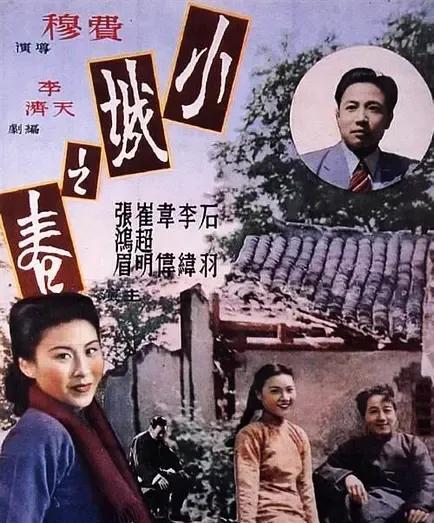In 2005, on the occasion of the centenary of the birth of Chinese cinema, the Hong Kong Film Awards named "Spring in a Small Town" as the "First Place in the 100 Chinese Films of the 100 Years". This is an honor posthumously awarded by the younger generations after the death of director Fei Mu, and it is also an affirmation of Director Fei and the movie "Spring in a Small Town".

Poster for the movie "Spring in a Small Town"
Released in 1948, the film is hailed as a pioneer of modern Chinese cinema, with a non-plot poetic narrative and a spin-off plot through which the characters change, giving the audience a refreshing feeling.
该片在拍摄的手段上有许多个第一,“中国第一部使用景深镜头拍摄的影片”、“中国第一部使用运动镜头拍摄的影片”等等。
Director Fei Mu uses the rhythm, perspective and sound of the streamlined characters and the flowing water in an enclosed space to express the depression and desolation of the human heart to the extreme, giving people a sense of immersion. The story has changed, but it does not continue, leaving an ending for the audience to fill in the blanks, so that the audience can not avoid suspicion.
The heroine smashed the small window in the middle of the door, and the male protagonist rushed in in a hurry but self-defeatedly injured the heroine's hand... The film from the inside out, from the outside to the inside, seems to be a love offensive and defensive battle. Coupled with the portrayal of the heroine's facial emotions, it shows the hearts of the male and female protagonists through subtle changes. The most intensive body part of the male and female protagonists in contact with each other is the hand, and the description of the hand and the hand further portrays the "offensive and defensive war" of this love.
From the beginning to the end of the film, it reveals a faint sense of melancholy and sorrow, as if it is an appearance of a foreshadowing of a rich tragedy. The literary lines that are in tune with the times portray a fragile and helpless immature woman and a small family in the old era and decline, which reveals the emotional memories of the old days between the two. Wanting to hide the shame and refuse to return the favor, Fei Mu easily used five people to describe a great pattern and unlimited possibilities, which is undoubtedly lamentable.